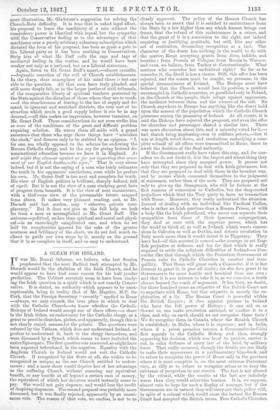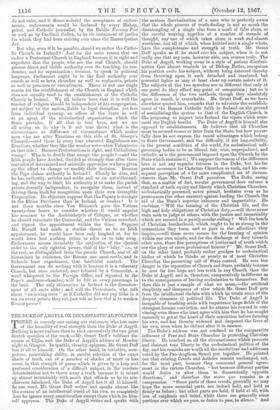A GLEAM FOR IRELAND.
IT was Mr. Bernal Osborne, we believe, who last Session prophesied that the next Radical task attempted by Mr. Disraeli would be the abolition of the Irish Church, and he would appear to have had some reason for his half jocular prediction. The Cabinet certainly seem to have been study- ing the Irish question in a spirit which is not exactly Conser- vative. It is stated, on authority which appears to be unex- ceptionable, being in reality that of Mr. Maguire, M.P. for Cork, that the Foreign Secretary "recently" applied to Rome —always, we may remark, the true place in which to deal with the Catholic Church—to know whether the Catholic Bishops of Ireland would accept one of three offers,—a share in the Irish tithes, an endowment for the Catholic clergy, or a grant to provide churches, glebes, and apparently, though this is not clearly stated, manses for the priests. The questions were referred by the Vatican, which does not understand Ireland, or profess to understand it, back to the clergy themselves, and were discussed by a Synod, which seems to have included the entire Episcopate. The first question was answered, as might have been expected beforehand, in the negative. Equality with the Anglican Church in Ireland would not suit the Catholic Church. If recognized by the State at all, she wishes to be recognized as unique, as the one Church entitled to endow- ments; and a mere share would deprive her of her advantage as the suffering Church, without ensuring any equivalent benefit, or any benefit at all beyond a certain sum of money, the equivalent of which her devotees would instantly cease to pay. She would not gain sixpence, and would lose the credit of despising sixpences. The second proposal was probably more discussed, but it was finally rejected, apparently by an unani- mous vote. The reason of that vote, we confess, is not to us clearly apparent. The policy of the Roman Church has always been to assert that it is entitled to maintenance from the State by a law higher than any which human beings can frame, that the refusal of this maintenance is a crime, and that the grant of it is a concession to the right, not indeed requiring or justifying gratitude, but still, like any other act of restitution, demanding recognition as a fact. The character of the donor has nothing in the world to do with the matter, Rome accepting grants from Jews, infidels, and heretics ; from Prussia at Cologne, from Russia in Warsaw, and even, we believe, from Turkey at Constantinople. What matters who concedes her undoubted right So far as he concedes it, the Devil is less a sinner. Still, this offer has been rejected, and the reason must be sought, we presume, in the special circumstances of Ireland. The Bishops must have believed that the Church would lose its position, a position unexampled in Catholic countries, or paralleled only in Poland, as the Church of the people, their refuge against oppression, the mediator between them and the owners of the soil. No Church anywhere in Europe has anything like the direct hold upon the masses of the population which the Catholic Church possesses among the peasantry of Ireland. At all events, it is said the Bishops have rejected the proposal, and even the offer for churches and parsonages shared a similar fate. There was more discussion about this, and a minority voted for it,— bad thatch being unpleasing even to celibate priests,—but it was at length voted down, and resolutions embodying a com- plete refusal of all offers were transmitted to Rome, there to await the decision of the final authority.
If the Govdrnment really have taken this step, and, for our- selves we do not doubt it, it is the largest and wisest thing they have attempted since they accepted power. It proves not only that they are prepared to deal with Irish grievances, but that they are prepared to deal with them in the broadest way, and by means which commend themselves to the judgment of statesmen, rather than of the mob. They are prepared not only to give up the Orangemen, who will be furious at the first rumour of concession to Catholics, but the deep-rooted prejudices which bind the Tory party to have no transaction with Rome. Moreover, they really understand the situation. Instead of dealing with an individual like Cardinal Cullen, who is rather an Irish partizan than a Roman Prince, or with a body like the Irish priesthood, who never can separate their sympathies from those of their ignorant congregations, they deal at once with the supreme power, which has the world to think of, as well as Ireland, which wants conces- sions in Calcutta as well as Dublin, and detests revolution in Italy much more than it would detest it in Tipperary. They have had—if this account is correct—the courage to set Eng- lish prejudice at defiance, and try for that which is really required to settle the religious difficulties of Ireland—a Con- cordat like that through which the Protestant Government of Prussia rules its Catholic Churches in comfort and tran- quillity. That Rome will grant such a Concordat, if it is her interest to grant it, is past all doubt ; for she does grant it to Governments far more hostile and heretical than our own ; and that it is our interest to take it is, as we conceive, a truth almost beyond the reach of argument. It has been, no doubt, for three hundred years an etiquette of the British Court not to negotiate with Rome, but that etiquette is merely the re- gistration of a lie. The Roman Court is powerful within the British Empire ; it does appoint persons in Ireland who have the full power of Bishops ; it can aid us or thwart us, can make revolution national, or confine it to a class, and why on earth should we not recognize those facts We do recognize them in Canada, where the Romish Church is established ; in Malta, where it is supreme ; and in India, where if a priest preaches treason a Commander-in-Chief first appeals to the Catholic Bishop, and then, strongly approving his decision, which was loyal to passion, carries it out, in calm defiance of every law of the land, by military force. That really occurred, though the details are not likely to make their appearance in a parliamentary blue-book, and to refuse to recognize the power of Rome only in the province where it is most complete is, on the most extreme Protestant view, as silly as to refuse to recognize crime or to deny the existence of pauperism in our streets. The fact is not altered by the refusal, while the results of the fact are infinitely worse than they would otherwise become. It is, we suppose, almost vain to hope for such a display of courage, but if the Government are in earnest they will carry out their policy still, in spite of a refusal which would cease the instant the Roman Court had accepted the British terms. Free Catholic Churches do not exist, and if Rome ordefed the acceptance of endow- ments, endowments would be declared by every Bishop, priest, and Catholic journalist, by the Dublin Evening Post as well as by Cardinal Cullen, to be the instalment of justice for which they had been striving ever since the Emancipation Act.
But why, even if it be possible, should we endow the Catho- lic Church in Ireland ? Just for the same reason that we endow a Protestant Church in England, because it is right and expedient that the people, who are the real Church, should possess direct and visible authority over its teaching, its ten- dencies, and its organization ; because, to speak in political language, Parliament ought to be the final authority over creeds as well as laws, churches as well as regiments, priests as well as premiers or executioners. There is not one single reason for the establishment of the Church in England which does not equally tend to the establishment of the Catholic Church in Ireland. We all believe here that it is well the teacher of religion should be independent of his congregation, yet subject to the nation, liable to legal discipline, yet free from individual tyranny, an officer of the State as well as an agent of the ecclesiastical organization which the State provides. If all that is true here, and we are all acting on it, why is it not true there ; what is the circumstance or difference of circumstance which makes men who are utter Erastians on this side of St. George's Channel,—and three in every four educated Englishmen are Erastians, whether they like the word or not—utter Voluntaries on that side ? Because Protestantism is right, and Catholicism wrong? Who is to decide that except the people ?—and the Irish people have decided, decided so strongly that after three centuries of determined and scientific oppression we have given up the effort to change or modify their decision. Because the Pope claims authority in Ireland ? Clearly he does, and he has authority, articles and oaths and so on notwithstand- ing, and the way to limit his authority is to make the parish priests decently independent, to recognize them, instead of driving them back for recognition upon their own intangible Corporation. Do objectors suppose that the Papacy is stronger in the Rhine Provinces than in Ireland, or weaker? It is not three months since Von Bismarck gave the Vatican twenty-four hours to consider whether it would appoint his nominee to the Archbishopric of Cologne, or whether he should terminate the Concordat, and the Vatican crouched, and signed the appointment within the time. Suppose Mr. Russell had made a similar threat as to an Irish appointment, he would have been only laughed at, for he would have had nothing either to offer or to take away. Endowment means invariably the subjection of the clerical order to the only rightful power, that of the "laity," i.e., of • the real, as distinguished from the pseudo Church, and of all hierarchies in existence, the Roman one most needs, and in Irelands least experiences, that healthful control. The Government can do nothing with it because it is a voluntary Church, but once endowed, once fettered by a Concordat, a word whispered in the Foreign Office, and repeated in the Pope's audience-chamber, will be felt in every parsonage in the land. The only alternative in Ireland is the disendow- ment of all sects alike ; and will the Protestants, who talk about "endowing error" as if Catholics did not pay tithe in a tax on every potato they eat, just tell us how that is to weaken Roman power ?































 Previous page
Previous page